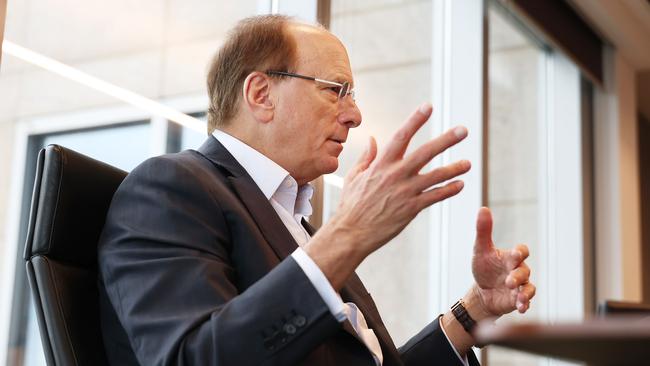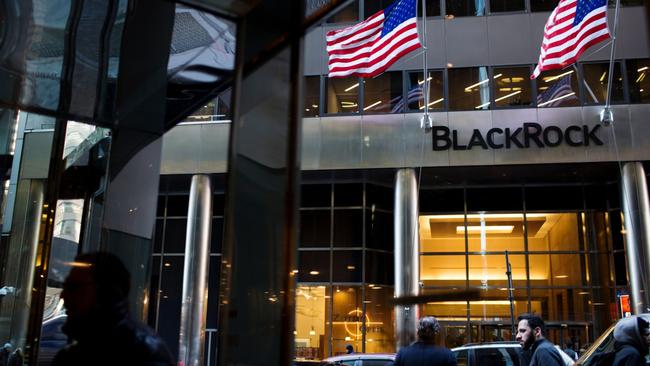BlackRock boss Larry Fink admits capitalism has ‘failed too many’ but argues for a new way in investing
The BlackRock boss has put forward a defence for globalisation as he argues markets hold the key to creating more evenly distributed wealth.

Business
Don't miss out on the headlines from Business. Followed categories will be added to My News.
The head of the world’s biggest asset manager has made a stark admission that capitalism failed too many people and is the force behind rising calls for protectionism.
However, BlackRock founder Larry Fink says in his annual letter to investors that is no reason to abandon markets, rather the way forward is to expand on them and let more people own a meaningful stake in the growth happening around them.
Fink, who oversees an $US11.6 trillion ($18.4 trillion) in assets around the world, cautiously addresses Donald Trump’s trade war, by acknowledging “protectionism has returned with force” but points out that globalisation has also fuelled “the greatest period of wealth creation in human history” over the past four decades.

However, he acknowledged this wealth has not been evenly shared, with millions – even in wealthier economies – being left behind. This has been reshaping politics.
“The unspoken assumption is that capitalism didn’t work, and it’s time to try something new. But there’s another way to look at it: Capitalism did work — just for too few people,” he says.
Fink’s latest annual letter is a much more market-focused document than he has written in recent years. The closely read letter sticks to the big themes of the tackling the growing retirement crisis; the impact of technology; and how the world can fund the massive infrastructure gap.
Gone are the warnings of climate crisis that often saw him attacked by some Republicans for pushing a line of ‘woke capitalism’. BlackRock even attracted lawsuits or calls for some US state-based pension funds to pull out of the Wall Street giant’s products.
Fink’s answer is to help current investors access parts of the market they’ve previously been restricted from, and by enabling more people to become investors in the first place.
Here he says a rethink is needed towards the traditional approach to investing. The boom in private markets means ever-increasing opportunity now sits outside stocks and bonds.
However, Fink says access to private markets is often off limits to all but the wealthiest, and is eyeing a way to “democratise” access to trillions of dollars in private credit, private equity, infrastructure and real estate.
This would be along the lines of how Fink’s BlackRock opened up index investing, by putting complex share trading strategies within reach of millions.

Fink’s comments mark a major shift for BlackRock. For nearly four decades, the investment house has focused on shares and bond management, with much of its growth come about by managing passive index-tracking products.
The Wall Street giant invests on behalf of dozens of Australian superannuation funds, including AusSuper and Australia’s Future Fund, as well as offering ETFs for retail investors.
But Fink said the rule guiding diversified investing that has benefited generations – the classic 60:40 portfolio of 60 per cent shares and 40 per cent bonds – may no longer hold.
“The future standard portfolio may look more like 50:30:20 — stocks, bonds, and private assets like real estate, infrastructure, and private credit.
“Assets that will define the future — data centres, ports, power grids, the world’s fastest-growing private companies — aren’t available to most investors. They’re in private markets, locked behind high walls, with gates that open only for the wealthiest or largest market participants,” Fink writes in his latest annual letter.
“You generally cannot buy shares in a new high-speed rail line or a next-generation power grid on the London or New York Stock Exchange. Instead, infrastructure projects are typically investable only through private markets. Private markets are, as their name suggests, private.
“The reason for the exclusivity has always been risk. Illiquidity. Complexity. That’s why only certain investors are allowed in. But nothing in finance is immutable. Private markets don’t have to be as risky. Or opaque. Or out of reach. Not if the investment industry is willing to innovate.”
Over the past year, BlackRock has spent nearly $US30bn across three buyouts putting it firmly in the private market space, including private credit specialist HPS investment partners, the private asset data provider Preqin and an alternative infrastructure manager GIP.
Fink also touches on a familiar theme of energy security. The rising tide of data centres is now consuming the energy that once powered entire US states, and the demand for more is growing.

Here, Fink raises the prospect of a greater role for nuclear in the name of “energy pragmatism”.
More dispatchable power starts with “fixing the slow, broken permitting processes in many modern economies.
“It also means being clear-eyed about our energy mix. Most new infrastructure investments have been flowing into renewables. But without major breakthroughs in storage, wind and solar alone can’t reliably keep the lights on.
“In the near term, more than half the electricity powering data centres must come from dispatchable sources. Otherwise, the airconditioning will shut off, the servers will overheat, and the data centres will shut down.
“Today’s nuclear isn’t the old model of massive plants with the ominous cooling towers. Small modular reactors (SMRs) are everything old nuclear wasn’t — cheaper to build, safer to run, and you can build them anywhere. China isn’t waiting. They’re building 100 gigawatts of nuclear, which — when completed — will mean they supply half the planet’s nuclear power.
“Why is China so bullish on nuclear? They see decarbonisation as a way to own the future of industry.”
eric.johnston@theaustralian.com.au
Originally published as BlackRock boss Larry Fink admits capitalism has ‘failed too many’ but argues for a new way in investing



